- Getting around Lijiang. Dont stay in the Old Towns more than 2 days, there is nothing to do. KRISS Oct 9, 2013 05:46
- 2013 Beijing Temple Fair BENNYLAU Feb 26, 2013 03:29
- Malaysian traveling from KUL - LAX vis Shanghai PVG ZATI_DY Jan 3, 2013 20:15
<A> GONGTAN GOING, GOING, GONE
- Views: 3257
- |Vote: 0 0
- |Add to Favorites
- |Recommend to Friends
The life blood
Long ago, throughout China her rivers where her life’s blood with boats being one of the most practical ways to travel and transport goods. The building of the Grand Canal alone and many others like it are testimony of this. In the mountainous southwest, overland travel was slow and tedious, leaving little choice than to navigate the often treacherous and swollen rivers. In the days before steam and today’s modern diesel engines, boats were sailed, poled, rowed and dragged up or downstream with many a loss of life and goods. Today of course it is relatively safe to travel on a variety of craft from the larger tourist cruise ships, the fast hydrofoils, smaller local long distance transports and small timber cross river ferries.
The Chang Jiang and her tributaries have for thousands of years played a vital role in transport, communication and military operations in the southwest of China. But in many regions, new roads, railways and dam projects are causing a decline in the dependence on river transport. Once the massive Three Gorges Dam comes completely online a few years from now it is expected to facilitate ocean-going vessels as far upstream as Chongqing, still the largest inland port in China.
On not such a grand scale is a new dam on the Wu Jiang, an incredibly picturesque and navigable tributary of the Chang Jiang. Just up stream from Pengshui, the dams completion next year will not only drown the valley, but the small somewhat famous ancient village of Gongtan and much of the evidence of those tough and treacherous tracking days before steam was introduced.
The people
While the old village of Gongtan may not rival Beijing, Xian or the Three Gorges with its history, culture and scenery, it is nonetheless a place of history, a place of ancient culture and characters, and a place of incredible scenery. It’s the home of the Toujia people and a little off the beaten track. Few people know about it much less have visited. It’s popular for white water rafting on the Apeng Jiang, which joins the Wu Jiang a little east of town. It boasts some of the sheerest cliffs around and recently played host to an International Rock Climbing competition. Movie makers have also seen the potential of Gongtan, choosing it as the filming location for several movies in recent years, taking advantage of rustic charm of several of the old courtyard homes and the spectacular cliff scenery along the rivers
A simple life
In another year residents who have lived here all their lives and know nothing else but faming the steep mountains above their old homes or fishing the wild river below will be moved to safer ground. A ‘new’ road already runs through the village high up the hill and a new settlement has sprung up along this stretch of road since it was built. Trucks, buses, cars, vans, bikes and almost everything else that moves ply up and down these days to the accompaniment of honking horns and exhaust fumes. But life is quiet and simple lower down the slope along the village’s original single narrow, stone slab street. Silent now except for the sounds of occasional hawkers selling bread or vegetables and neighbours chatting by their doors.
Traditional houses built on stone foundations and tall timber poles line both sides of the street as it meanders along the steep hillside, up and down over gullies and stone bridges giving access to the family homes along the way. Narrow stone flagged stairways wind down to the river below and up to the new village above. Once the only ways in here was by river or goat tracks over the mountains. A walk along the riverbank reveals the remains of huge steel blocks and winch housings once used to haul boats up through the rapids below the village. Deep grooves in the rocks are testimony of the pressure and resistance of the water on the vessels, winches and wires.
For one yuan you can ride the ferry with the locals across the Wu Jiang into Guizhou Province where you can take some great walks through the local Toujia villages. Just follow the them as they make their way home up the hill to the left.
A rich life
Our host in Gongtan was a diminutive woman of 92 years of age. Today she shares her home with her 72 year old daughter in law. All four of her grandchildren have moved away to work, only one comes to visit on Sundays from a nearby city. Her home was huge, comfortable and very clean. A large central room with a high ceiling was flanked on either side by two equally large bedrooms, a storeroom was at the back and beyond this a bath house of sorts at the back of a kitchen and laundry which ran along one side of the house. A small stream flowed down the steep hill under the laundry. Out the front to the left of the courtyard was a two-story addition with two small but comfortable bedrooms on the first floor with a balcony over the street and an attic containing another four beds. These were ours for the two days we spent there.
A fishpond was the central feature of the courtyard. The whole compound was fenced in stone and the gate a few steps up from the street was closed securely each night. Flowering plants and vines grew at random about the courtyard. All the doorways had a wooden threshold, some as high as 12 inches. This is a common feature in rural houses. Our elderly host was very lucid and active, helping to clean house and prepare meals for us. Her family still farms a plot of land up the mountain about 30 minutes walk either way, but the only sign of farming was some corn drying in a large shallow woven basket by the front door.
Neither lady was happy to be moving the few kilometers up town. While it doesn’t sound far it is a long way from their very comfortable and familiar family home, where they have spent their whole lives and raised their families. Sure they will have a nice new home but it will never be the same. Their beautiful old timber home with its simple furnishings, four poster beds and mosquito nets has become a charming guesthouse providing visitors with a window into their simple yet fulfilled lives.
The past
Just down the street is one of a few small restaurants along the old street, a lovely little outdoor place overlooking the river. It is attached to a family home, which also offers accommodation. A marker on the corner of their home indicates the new river level after the dam comes online next year. A leisurely walk along the old street reveals an assortment of interesting buildings. A jail, temples and the Salt Traders Guild Hall, now rather run down, this also includes a theatre within the compound. Once magnificent buildings on this once significant trading route, their fate is also sealed.
The river
How else could we leave Gongtan than by the river? A boat makes the run upstream in the morning and returns downstream arriving at Gongtan just after midday. It was raining as we made our way to the other end of town and down to the riverbank where passengers scramble up and down some makeshift stairs chiseled in the rocks. It’s a precarious task with a load on your back. We were able to sit on the front deck and enjoy the view as we ran the mild rapids downstream.
All along the banks was evidence of the ‘Ancient Plank Roads’ now almost lost to rising water levels in so many of the rivers in the southwest of China. Sometimes this ‘road’ was cut from the rock, barely a meter high and often only half a meter wide in places. In other places smalls holes where cut at intervals for beams to support something like a modern day boardwalk. Along such a ‘road’ as this, men, often naked and wearing only hand made grass sandals on their feet hauled on ropes made from bamboo thongs, laid over their shoulders, dragging heavily laden boats upstream against the rapids until they could either row or sail again under their own steam. And for this dangerous and hard work they were paid a pittance.
After less than an hour we changed boats, this one a little larger and for the next two hours we cruised through some pretty inaccessible country. People on shore waited on large rocks or dark sandy beaches for us to put in for them. When passengers indicated they wanted to disembark, our skipper would poke our bow shoreward and they would jump ashore. As we moved off again we watched them make their way over jagged rocks and up the slope to where a scanty path would eventually led to some level farmlands and houses.
But much of the bank is cliffs dotted with caves. Some farmhouses with their boats moored below use a flying fox to get supplies up and down from the river and their own boats to take their produce to market. Our journey on the river came to an end at the construction site of the new dam just upstream from Pengshui. A dismal looking shantytown has sprung up here to service the workers on the site. The mountains round about are heavily scarred, a result of blasting and filling for the dam walls, roads and tunnels.
The future
What will the future hold for the once wild Wu Jiang?
More photos
Want to see more of gongtan before it is gone?
Why not view my photo album series Gongtan, going, going, gone.



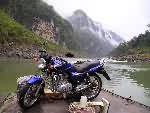

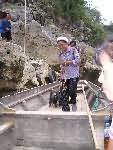
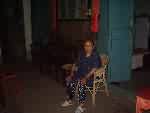
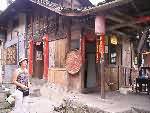
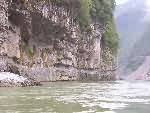
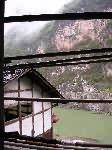
 Copyright © 1998-2026 All rights reserved.
Copyright © 1998-2026 All rights reserved.
1.
Oct 7, 2005 11:31 Reply
WOCCA said:
I am truly impressed by the standard of this writing.